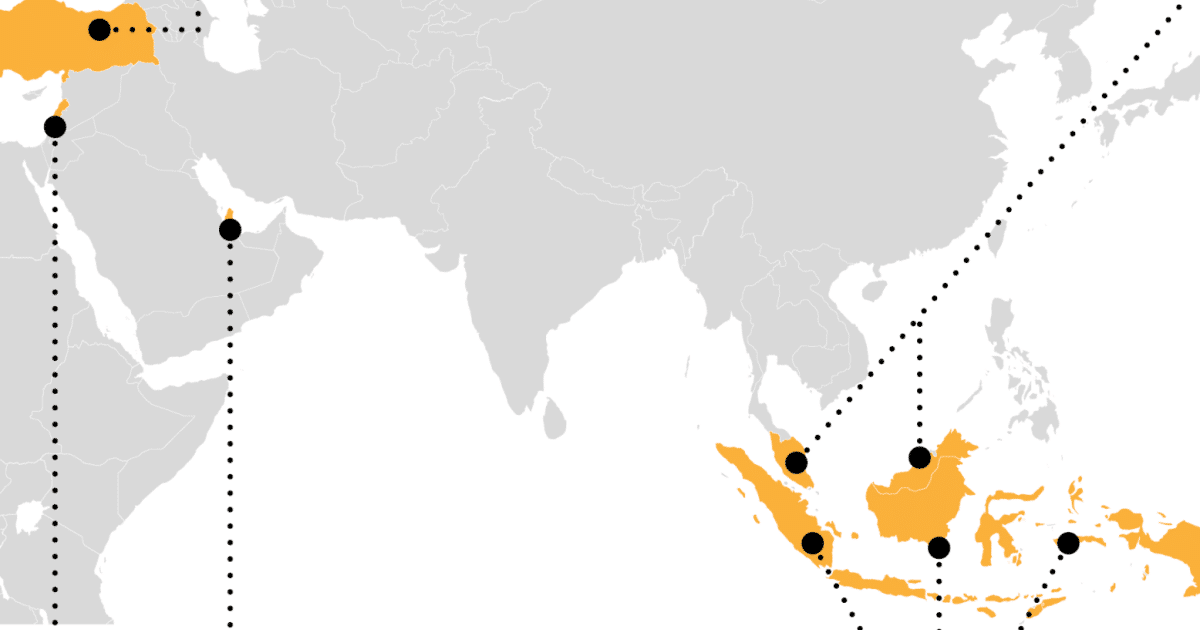Hamas has found itself in a difficult position because of Israeli defenses along the border with Gaza, leading the organization to search for solutions on the outside. Among other things, the organization is using Palestinian engineers and academics around the world to promote development advanced rockets and militarized drones.
In Turkey, Indonesia, Tunisia, Lebanon and other countries, Hamas is raising funds and recruiting activists, building ties, and increasing its offensive military capabilities. The killing of engineer Fadi al-Batash in Kuala Lumpur on Saturday morning, an attack Hamas attributed to Israel, and previous killings elsewhere around the world, demonstrates coordinated attempts to head off such operations.
Israel has not officially responded to the killing of al-Batash or to accusations that the Mossad was responsible. However, the attacks reflect a consistent pattern of attacks on Hamas operatives overseas, which has been picking up speed in recent years.
Hamas is finding it difficult to counteract the IDF’s defenses, which include systems to intercept incoming projectiles, technology for detecting tunnels, and soon a protective wall along the border between Gaza and Israel. From an economic perspective, the organization is unable to hold on to and upgrade its military capabilities, and it needs to reinvent itself.
In recent years, Hamas has tried to find solutions outside of Gaza and has diversified financially, militarily and organizationally into a number of countries. Maher Salah, the head of Hamas overseas, in part owes his place in the Hamas hierarchy to his being very close to the group’s deputy chief,Saleh al-Arouri. Most of the time Salah lives in the Gulf states, but he travels between countries whose financial and military support he has succeeded in enlisting.
In 2015, Salah was arrested in Saudi Arabia on suspicions of money laundering and smuggling cash from Riyadh. The U.S. Treasury Department froze his assets and banned doing business with him. In various countries he visits, Salah tries to raise funds for Hamas, create ties, and identify talents to advance enterprises that will aid the Hamas campaign against Israel.
In Indonesia, for example, Salah found fertile ground for finding Palestinian engineers and academics to work on arms development for Hamas. At Salah’s behest, Hamas operatives in the world’s most populous Muslim nation are working to recruit Palestinian students for the organization’s initiatives. Operatives like Fadi al-Batash coordinate these enterprises, which are mostly related the development of rockets and drones.
Salah was also responsible for the investigation into the death of senior Hamas leader and drone engineer Mohammed Zawahri, who was killed in Sfax, Tunisia in December 2016. Foreign reports attributed the killing to the Mossad. He was shot in his car by unknown assailants who used a silenced gun. Tunisia may not be a country where Hamas can operate with complete freedom, but Salah used Zawahri on behalf of Hamas when he identified an opportunity to do so, and saw him as someone who could take Hamas’ drone program a step forward.
Salah also operates in Qatar, where he mostly deals with fundraising. Qatari businessmen open their wallets for him and donate to Hamas, whether because of their own business interests or because of their support for the organization’s goals.
Another major theater for Hamas operations is in Turkey. Recently, the Shin Bet security service exposed a fundraising network for Hamas run by Turks and Palestinians. In recent years, Turkey has become a major center for Hamas recruitment, as operatives work to identify Israeli Arabs and who arrive in the country in the guise of businessmen and tourists.
The situation is a bit different in Lebanon. Israeli defense officials say that Hamas leaders traveling to Lebanon in recent years are trying to set up a network of missiles to be used against Israel when fighting breaks out again. Salah operates there alongside Salah Arouri, who leads the pro-Shi’ite strategy of the Sunni Hamas and is pushing for closer relations with Iran. The goal is not to concentrate a large force in Lebanon, but instead to create a situation that will enable Hamas to open a second front against the IDF when the next round of fighting arrives. The idea is that the northern front will keep the IDF busy and divert Israel’s aerial defenses from elsewhere to the north. The ties between Hamas, Hezbollah and Iran are what enable the organization’s Lebanese operations.
In Lebanon too, as in other places where Hamas operates, targeted killings – or attempted ones – have taken place. In January, Hezbollah Secretary General Hassan Nasrallah blamed Israel for an attempted hit on Hamas official Mohammed Hamdan in southern Lebanon.
The map of Hamas operatives’ deaths around the world shows that while the organization is trying to find ways to develop outside the confines of the Gaza Strip, there are those who seek to nip this in the bud.
The killing of al-Batash, the assassination in Tunisia, and the attempted killing in Lebanon reflect a changing trend. The killing of Mahmoud al-Mabhouh in Dubai in 2010, which was attributed to Israel, was carried out after Hamas developed its rocket project. In comparison, the contrast of al-Batash and the others took place at an earlier stage, before the projects they were working on were completed. As this point, it is still not clear how close those who were killed were to manufacturing the weapons for Hamas, weapons which could change the battlefield against Israel.















